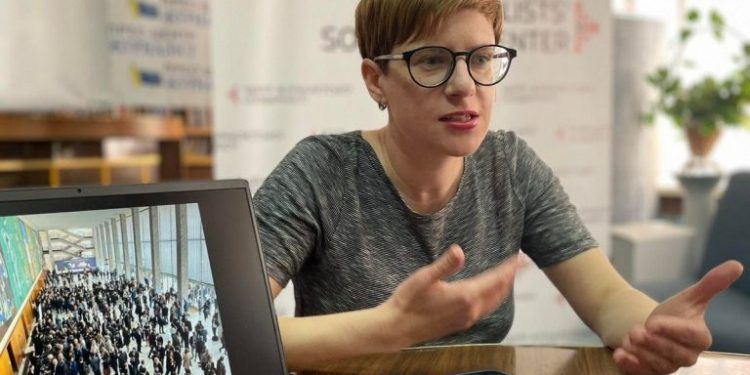Local media workers and displaced journalists had the opportunity to talk to a war photojournalist, Kateryna Klochko, who recently returned from Brussels, where she spoke at the European Parliament.
The meeting was organized by the Zaporizhzhia Journalists’ Solidarity Center (JSC).
Kateryna Klochko shared her impressions of the trip she participated in as part of a delegation of journalists from the front-line territories. In particular, she said that from the rostrum of the European Parliament, she showed her photos of the consequences of Russian shelling of the cities of Zaporizhzhia, Huliaipole, and Orikhiv.
“It was our main task to once again remind the European parliamentarians about the terrible truth about the war, grief, and destruction that the Russian aggressors are bringing to Ukraine, as well as about the heroism of our defenders,” she said.
In addition, with her colleagues from Sumy and Chernihiv, she shared her wartime experience and voiced the challenges Ukraine is facing during the large-scale invasion.
“I presented the parliamentarians with a Ukrainian flag with the signatures of our female soldiers from the Zaporizhzhia territorial defense units as a reminder that we are fighting but need constant support. And, I must say, we felt it [the support]- sincere and powerful one,” noted Kateryna.
She also said that Ukrainian media representatives raised the issue of the need for life insurance for Ukrainian journalists working on the front line and countering Russian propaganda fakes.
Call the Zaporizhzhia JSC by dialing 096 277 5352 (Nataliya Kuzmenko, the Zaporizhzhia Center coordinator). It is located at 152 Sobornyi Avenue.
As earlier reported, the Journalists’ Solidarity Centers is an initiative of the NUJU implemented with the support of the International and European Federations of Journalists and UNESCO. The initiative is designated to help media representatives working in Ukraine during the war. The Centers operate in Kyiv, Lviv, Ivano-Frankivsk, Chernivtsi, Zaporizhzhia, and Dnipro and provide journalists with organizational, technical, legal, psychological, and other types of assistance.
UNESCO is the United Nations Educational, Scientific, and Cultural Organization. It contributes to peace and security by promoting international cooperation in education, sciences, culture, communication, and information. UNESCO promotes knowledge sharing and the free flow of ideas to accelerate mutual understanding. It is the coordinator of the UN Action Plan on the Safety of Journalists and the Issue of Impunity, which aims to create a free and safe environment for journalists and media workers, thus strengthening peace, democracy, and sustainable development worldwide. UNESCO is working closely with its partner organizations in Ukraine to provide support to journalists on the ground.
The designations employed and the presentation of material throughout this digest do not imply the expression of any opinion whatsoever on the part of UNESCO concerning the legal status of any country, territory, city, or area or its authorities or concerning the delimitation of its frontiers or boundaries.
The authors are responsible for the choice and the presentation of the facts contained in this digest and for the opinions expressed therein, which are not necessarily those of UNESCO and do not commit to the organization.
Valentyna Bystrova. Photo: Dariya Zyrianova

 THE NATIONAL UNION OF
JOURNALISTS OF UKRAINE
THE NATIONAL UNION OF
JOURNALISTS OF UKRAINE
















Discussion about this post